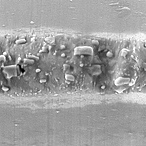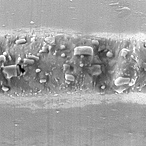Example of grades: ASTM 440A, 440C, D2, Alleima® 19C27
 Coarse-carbide tool steel grades have a large amount of primary carbides. These carbides are the large white spots in the picture and they have about 50,000 times bigger volume than the small secondary carbides in the picture that represents our Alleima® 12C27.
Coarse-carbide tool steel grades have a large amount of primary carbides. These carbides are the large white spots in the picture and they have about 50,000 times bigger volume than the small secondary carbides in the picture that represents our Alleima® 12C27.

These large carbides contribute to the wear resistance of the steel but, at the same time, they also reduce the toughness and the sharpness potential of the blade.
The large carbides in coarse-carbide tool steel make the knife very difficult to sharpen and tend to fall out of the cutting edge. As a result, knife blades made of this type of steel become micro-serrated. Coarse-carbide tool steels were developed for stamping tools and various wear parts. Stamping tools usually have 90-degree edges, for which the large carbides are not a problem.
Coarse-carbide tool steels are suitable for knives for which the wear resistance demands are very high and for which blunt edge angles are acceptable, but on which the sharpness and toughness demands are low. This steel type is not at all compatible with keen knife edge geometries.
Our Alleima® 19C27 is a coarse-carbide knife steel grade recommended for industrial applications, such as for cutting fibers and paper.